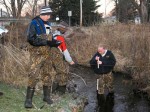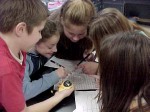The Kellogg Biological Station (KBS) has recently joined the ranks of other LTER sites (notably CAP, JRN, NTL, SEV, and SGS) with successful GK-12 Graduate Fellowship Programs funded by the National Science Foundation. The 3-year award provides funding and training for KBS graduate students and allows for the continuation of the KBS K-12 Partnership for Science Literacy that began in 1999 with Schoolyard LTER funding. Through the GK-12 grant, eight GK-12 fellows are paired with eight participating school districts. The fellows spend 10-15 hours per week in partner teachers' classrooms observing, co-teaching, and developing classroom lessons and schoolyard ecology projects. Graduate fellows provide teachers additional resources to enrich the K-12 science curriculum while improving their own teaching abilities.
By all accounts the program is off to a great start. Collectively, fellows have spent over 1500 hours in partner schools and created over 30 ecology lessons (see details at www.kbs.msu.edu/education/k-12-partnership). Fellow-teacher teams have written three successful grant proposals to fund field trips and school projects. Teams have also presented information about their district activities at local School Board meetings and at the 2007 Michigan State Science Teachers Association Meeting.
A summer workshop helped to kick off the program last year and so far this year KBS has hosted three 1-day workshops for teachers on the themes "Using Data Sets in Classroom Inquiry," "Animal Behavior," and "Local Ecological Issues." A final school-year workshop on "Climate Change" will include highlights from KBS research, a presentation about local climate change from the Michigan State climatologist, and classroom inquiry activities developed by GK-12 fellows. In conjunction with the workshop, the GK-12 program will be sponsoring a climate change poster contest for K-12 students.
In an effort to "leave no child indoors," district teams have created areas for schoolyard ecology projects in their districts. GK-12 fellow Brook Wilke and students from Martin Public Schools are creating a historic agriculture garden and a successional field adjacent to their classroom. Fellow Justin Kunkle and students at Harper Creek High School are learning chemistry by studying the effects of impervious surfaces on streams near their school. GK-12 fellows Edi Sonntag (Olivet Middle School) and Katie Lander (Lawton Middle School) have been working with their students to create rain gardens on their school grounds.
Fellows described their recent experiences with K-12 education as "fun," "challenging," "rewarding," "exhausting," and "wild." For the rest of the school year, teachers and fellows will continue to work together to promote ecological literacy in K-12 schools in rural southwest Michigan. This summer, KBS will host another week-long workshop focused on providing inquiry-based approaches for K-12 science instruction, and meetings to develop a children's book for the Schoolyard LTER book series.
Finally, KBS researchers are excited to have one of the GK-12 teachers, Russ Stolberg, join the LTER team as part of the Research Experiences for Teachers program.
For further information please contact KBS GK-12 Coordinator Laurel Hartley (lhartley@kbs.msu.edu).
Laurel Hartley is Kellogg Biological Station's GK-12 Project Manager

 Enlarge this image
Enlarge this image

